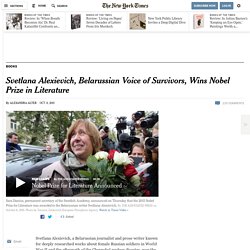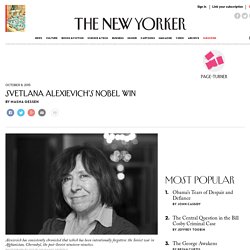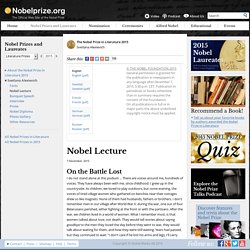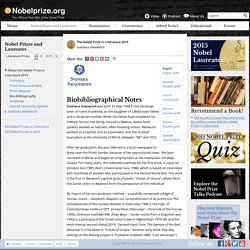

Svetlana Alexievich Wins Nobel Prize in Literature. This video is not currently supported on your browser.

Continue reading the main story Video Svetlana Alexievich, a Belarussian journalist and prose writer known for deeply researched works about female Russian soldiers in World War II and the aftermath of the Chernobyl nuclear disaster, won the Nobel Prize in Literature on Thursday “for her polyphonic writings, a monument to suffering and courage in our time,” the Swedish Academy announced.
Ms. Alexievich, 67, is the 14th woman to win the literature prize, and one of just a few Nobel laureates to be recognized for nonfiction. While the Nobel committee has occasionally awarded the prize to philosophers and historians, including Bertrand Russell and Winston Churchill, it has been more than half a century since a dedicated nonfiction writer has won what many regard as literature’s most prestigious award.
The selection of Ms. Continue reading the main story Ms. The stories Ms. Many of her books are woven together from detailed oral histories. Svetlana Alexievich’s Nobel Win. Svetlana Alexievich’s book “Voices from Chernobyl: The Oral History of a Nuclear Disaster” begins with a woman’s account of watching her husband, a firefighter, physically disintegrating in a hospital bed in the days following the April, 1986, nuclear-plant explosion.

“It’s as good as Shakespeare,” she said of the quality of the woman’s words when I asked her about that part of the book, years ago. “But do you know how long it took to get her to produce those two pages of text?” The first hours—and subsequent hours and hours—of an interview, Alexievich explained, are always taken up by the rehearsing of received memories: newspaper accounts, other people’s stories, and whatever else corresponds to a public narrative that has inevitably already taken hold.
Only beneath all those layers is personal memory found. The Swedish Academy, which announced today that Alexievich will receive the Nobel Prize for Literature, cited the writer for inventing “a new kind of literary genre.” Nobel Lecture by Svetlana Alexievich. 7 December, 2015 On the Battle Lost I do not stand alone at this podium ...

There are voices around me, hundreds of voices. They have always been with me, since childhood. I grew up in the countryside. Here are a few sad melodies from the choir that I hear ... First voice: "Why do you want to know all this? Second voice: "We lived near the Chernobyl nuclear plant. Third Voice: "The first time I killed a German ... It didn't scare me to kill someone ... The same dream ... I couldn't tell my son about that dream. Flaubert called himself a human pen; I would say that I am a human ear. The road to this podium has been long – almost forty years, going from person to person, from voice to voice. I lived in a country where dying was taught to us from childhood. I have written five books, but I feel that they are all one book. Varlam Shalamov once wrote: "I was a participant in the colossal battle, a battle that was lost, for the genuine renewal of humanity.
" My father died recently. The Nobel Prize in Literature 2015 - Bio-bibliography. Biobibliographical Notes Svetlana Alexievich was born 31 May 1948 in the Ukrainian town of Ivano-Frankivsk, as the daughter of a Belarusian father and a Ukrainian mother.

When the father had completed his military service, the family moved to Belarus, where both parents worked as teachers. After finishing school, Alexievich worked as a teacher and as a journalist, and she studied journalism at the University of Minsk between 1967 and 1972. After her graduation she was referred to a local newspaper in Brest near the Polish border, because of her oppositional views. She later returned to Minsk and began an employment at the newspaper Sel'skaja Gazeta. By means of her extraordinary method – a carefully composed collage of human voices – Alexievich deepens our comprehension of an entire era.
Bibliography – a selection Works in Russian У войны не женское лицо. Последние свидетели: книга недетских рассказов. Цинковые мальчики. Зачарованные смертью. Чернобыльская молитва: Хроника будущего. Svetlana Alexievich - Facts.